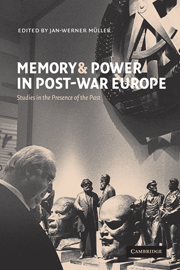Introduction: the power of memory, the memory of power and the power over memory
Published online by Cambridge University Press: 22 September 2009
Summary
Not ideas, but material interests, directly govern men's conduct. Yet very frequently the ‘world images’ that have been created by ‘ideas’ have, like switchmen, determined the tracks along which action has been pushed by the dynamic of interest.
Max WeberToday Europe rummages through drawers of memories, particularly those which contain the traumatic files of the First World War, the Second World War, fascism and communism.
Dubravka UgrešićThe best that can be achieved is to know precisely what [the past] was, and to endure this knowledge, and then to wait and see what comes of knowing and enduring.
Hannah ArendtMemory matters. It matters for the simple reason that memory is an anthropological given, since ‘all consciousness is mediated through it’. However, stressing this fact at the current historical juncture risks invoking a cliché, since ‘memory’, both individual and collective, lies at the intersection of so many of our current concerns and organises many of our current projects. As Ian Hacking has pointed out, memory has become ‘a powerful tool in quests for understanding, justice and knowledge’. Yet, for all the present obsession with ‘memory thinking’ (Hacking), there have been almost no studies of the nexus between memory and political power, especially if one defines politics rather narrowly as the output of political institutions.
- Type
- Chapter
- Information
- Memory and Power in Post-War EuropeStudies in the Presence of the Past, pp. 1 - 36Publisher: Cambridge University PressPrint publication year: 2002
- 38
- Cited by

